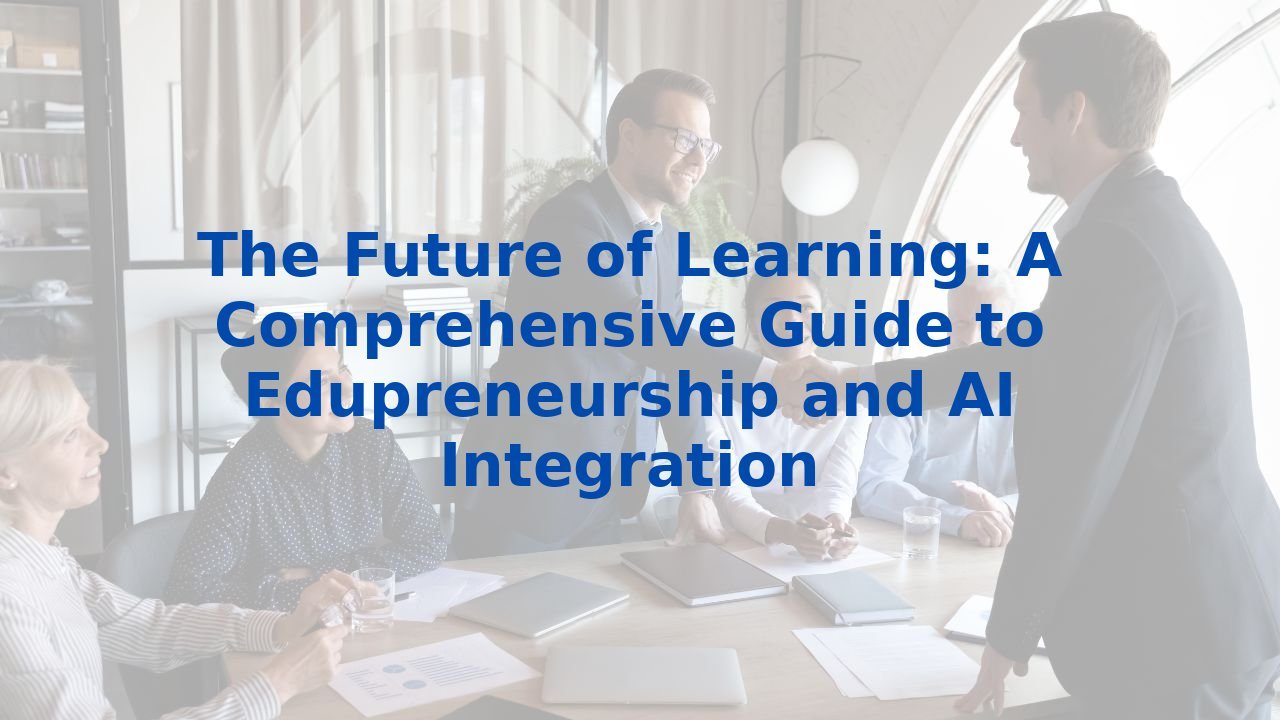The Future of Learning: A Comprehensive Guide to Edupreneurship and AI Integration
The Future of Learning: A Comprehensive Guide to Edupreneurship and AI Integration
In the ever-evolving landscape of education and business, we stand at the intersection of innovation and necessity. Edupreneurship, a blend of education and entrepreneurship, offers enormous potential for transforming how we learn and operate in the business world. As we delve into the future of learning, one thing is clear: the integration of Artificial Intelligence (AI) is revolutionizing this space. Let’s explore how AI enhances the various processes involved in edupreneurship and the remarkable benefits it brings to efficiency within organizations.
1. The Power of Automation in Education
Imagine a world where mundane administrative tasks become a thing of the past. With AI, this is now a reality. By leveraging AI-powered systems, educational institutions and businesses can automate repetitive processes such as enrollment, grading, and scheduling. This automation frees up valuable time for educators and administrators, allowing them to focus on what truly matters—engaging with students and fostering creativity.
For instance, AI-driven platforms can handle routine inquiries from students, ensuring that each question receives a timely and accurate response. As a result, human resources can be allocated toward addressing more complex learner needs, enriching the educational experience.
2. Unlocking Insights through Advanced Data Analytics
Incorporating AI into educational processes leads to a treasure trove of insights. Through advanced data analytics, organizations can process extensive amounts of information, offering personalized learning experiences tailored to individual student preferences. AI can track behavior patterns, preferences, and outcomes, allowing educators to design courses that resonate deeply with their audiences.
Moreover, with predictive analytics, businesses can forecast trends and adapt their offerings to meet future demands. This iterative feedback loop fuels a culture of continuous improvement, ultimately enhancing the efficacy of educational programs.
3. Optimizing Learning Processes
AI doesn’t just analyze; it actively optimizes. By identifying bottlenecks in learning processes, organizations can streamline workflows and enhance productivity. Just as a business might reengineer its operations for maximum efficiency, educational institutions can adopt similar practices to ensure a seamless learning journey.
Utilizing AI to pinpoint inefficiencies means higher satisfaction rates among learners and educators, as they can focus seamlessly on the curriculum and support services, rather than navigating bureaucratic hurdles.
4. Predictive Maintenance of Learning Platforms
Imagine an educational technology system that anticipates its own maintenance needs. With AI, predictive maintenance becomes a reality. By monitoring system performance, AI can prevent potential failures before they disrupt learning. This reliable infrastructure keeps educators connected to their students, fostering a more engaging learning environment.
5. Enhancing Decision-Making with AI Insights
AI solutions provide timely and accurate insights that guide decision-making in educational contexts. By analyzing vast datasets, organizations can identify emerging trends, pinpoint weaknesses, and seize opportunities to enhance their educational offerings.
This heightened understanding of market dynamics enables decision-makers within educational institutions to respond with agility, positioning their programs at the forefront of innovation.
6. Elevating Employee Productivity in Educational Settings
One of the most significant advantages of AI integration is its ability to enhance employee productivity. Virtual assistants powered by AI can manage scheduling, optimize communications, and even analyze student feedback, allowing educators to devote their time to interaction and mentorship.
This shift not only boosts morale but also transforms the nature of work in educational settings, enabling a more dynamic and engaging atmosphere for both educators and learners.
7. Building Stronger Relationships through Improved Customer Satisfaction
The educational environment thrives on relationships. AI enhances customer satisfaction by providing personalized learning experiences and immediate assistance. Efficient AI-driven customer support systems allow institutions to address student concerns faster, fostering loyalty and trust. When learners feel valued and understood, they are more likely to engage deeply with their education.
The Importance of AI Training for Edupreneurs
As we integrate AI into our educational frameworks, it’s vital to invest in training for employees. Providing teams with the necessary skills to work with AI technologies creates a workforce capable of adapting to change and driving innovation forward. The benefits of AI training are manifold:
- Adaptability: Employees equipped with AI skills can swiftly adapt to new technologies, ensuring agility in a changing landscape.
- Leadership Development: Proficient individuals in AI open the door to strategic roles, aiding in the cultivation of future leaders.
- Increased Employability: In a world increasingly driven by AI, those adept in its use become highly sought after in the job market.
Conclusion
The fusion of edupreneurship and AI is not a mere trend; it's a movement towards a more efficient, engaging, and effective learning environment. By integrating AI into educational processes, organizations can enhance productivity, streamline operations, and unlock the full potential of their teams and learners alike. When we commit to training our employees in AI, we create a resilient workforce prepared to tackle the challenges of tomorrow.
As we stand on the brink of a transformative era in education, the path forward is clear—embracing AI is not just beneficial; it's essential.



